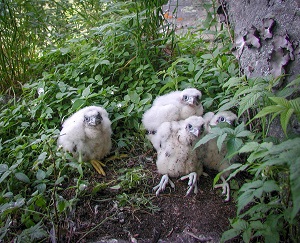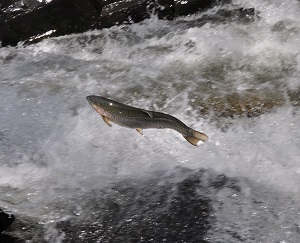Cliff Tops and Overlooks Closed to Protect Nesting Peregrines
MONTPELIER, Vt. -- Hiking Vermont’s
hillsides is a great way to enjoy a spring day, but the Vermont Fish &
Wildlife Department and Audubon Vermont recommend checking to see if the area
you’re planning to hike or climb is open. Several cliff areas are
currently closed to protect nesting peregrine falcons.
“Peregrine nesting is well underway
this spring,” said John Buck, Vermont Fish & Wildlife Department
biologist. “The falcons are very sensitive to human presence so we ask
climbers and hikers to please avoid the nest sites with a respectful
distance. The closures help people to choose an alternative route in
advance.”
Barnet Roadcut (Barnet) – Rte 5 pullout closed
Bolton Notch (Bolton) – Upper Upper West cliff closed to climbingBone Mountain (Bolton) – portions of cliff closed to climbing
Deer Leap (Bristol) – closed
Eagle Ledge (Vershire) – cliff access closed
Fairlee Palisades (Fairlee) – cliff top closed
Hazens Notch (Lowell) – portions of cliff closed to climbing
Marshfield Mt (Marshfield) – portions of cliff closed to climbing
Mt. Horrid (Goshen) – Great Cliff overlook closed
Nichols Ledge (Woodbury) – cliff top closed
Rattlesnake Pt (Salisbury) – cliff top closed
Snake Mountain (Addison) – overlook south of pond closed
“The areas closed include the
portions of the cliffs where the birds are nesting and the trails leading to
the cliff tops or overlooks,” said Buck. “We will update the closure list
as more nesting data are reported.”
The Vermont Fish & Wildlife
Department partners with Audubon Vermont to monitor the sites throughout the
nesting season. These sites will remain closed until August 1, but if a
falcon pair doesn’t nest or if the nest is not successful, the sites will be reopened
sooner.
Last year
was a respectable nesting season for Vermont’s peregrine falcons, with more
than 51 pairs successfully producing at least 63 young birds.
“The
peregrine’s recovery is a great success story,” said Margaret Fowle, Audubon
Vermont Conservation Biologist. “The population continues to do well
thanks to the efforts of our many community scientists and partners.”
“We appreciate the public’s
support in respecting the cliff closures,” said Buck. “The peregrine
falcon was removed from the endangered species list in 2005 -- due, in part, to
people respecting the falcon’s nesting period.”
You can report peregrine sightings
by calling Vermont Fish & Wildlife or emailing fwinformation@vermont.gov
For Immediate Release: May 21, 2018
Media Contacts: Margaret Fowle, Audubon Vermont 802-238-0046
John Buck, VT Fish & Wildlife Department 802-476-0196
Steve Parren, VT Fish & Wildlife Department 802-338-4880



